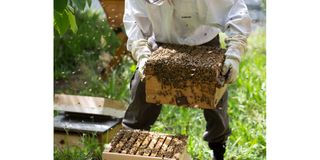Prime
Bee venom could be a game-changer for entrepreneurs

What you need to know:
- As a result of its high demand, just one gramme of the venom could cost as much as Sh300,000 in some markets
Dar es Salaam. Bee venom could be a new topic for most beekeepers in Tanzania.
But experts say it is one of those products that could easily turn one into a billionaire.
The poison that makes bee stings painful is an important ingredient in the world of medicine.
As a result of its high demand, just one gramme of the venom could cost as much as Sh300,000 in some markets, an expert in the extraction of bee venom said at the weekend.
“The bee venom market is huge in countries with a vibrant pharmaceutical industry where just a single gramme of it can cost up to Sh300,000 or more,” said Mr Patrick Kitosi, the managing director of Sensor Tanzania Limited, a company that specialises in the production of equipment that helps beekeepers extract venom from bees.
“Locally, one gets between Sh40,000 and Sh50,000 for a gramme of bee venom, but in short, it is an opportunity that goes by unnoticed,” he said. His company is one of the startups that have received financing from the Commission for Science and Technology (Costech).
He got Sh30 million to boost the production of equipment that helps keepers in the extraction of bee venom.
After four years of working on equipment research and design, Mr Kitosi says it is now ready to go for the commercialization stage.
The equipment works in such a way that it is placed close to the beehive. It senses a bee whenever it lands on it. Having sensed the bee landing on it, the equipment produces a small amount of an electric shot that bothers the bee, which then decides to bite it and leave its venom there.
“Once a bee gets bothered and bites the equipment, it reacts in such a way that other bees regard it [the equipment] as their enemy, and as such, they bite it more and in large numbers, thereby giving the keeper much more venom,” he told editors who visited him at the weekend.
Having entered the commercialization stage, he said, his company now produces the equipment in various sizes, and the price of each depends on its capacity to extract bee venom. Available literature shows that bee venom has traditionally been used to treat inflammatory diseases such as rheumatism.
It has also been known to be used as an adjunct in the treatment of neurological disorders, asthma, and infectious diseases such as malaria, among others.




